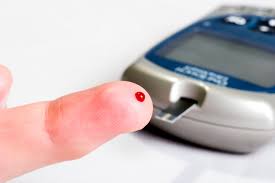
Blood Sugar Control/Diabetes Mellitus
Diabetes Mellitus (DM) is a group of metabolic diseases in which a person has high blood sugar, either because the pancreas doesn’t produce enough or because cells do not respond to insulin.
Obesity is the greatest risk factor for type 2 DM and accounts for 80-85% of overall risk. Almost two thirds of the UK are overweight – 62% of women and 66% of men, and 21% of men and 26% of women are obese. Even more alarming, 1 in 4 children in reception/beginning primary school overweight or obese, by year 6 it increases to 1 in 3.
Other risk factors include sedentary lifestyle and genetics, in fact, the influence of genetics is much stronger in type 2 than in type 1 DM.
Pre-diabetes
Many more people have blood sugar levels above the normal range, but not high enough to be diagnosed as having diabetes. This is known as pre-diabetes. If your blood sugar level is above the normal range, your risk of developing type 2 DM is drastically increased.
So What's the Problem?
Insulin facilitates the entry of glucose and amino acids into cells, as well as stimulating storage of excess energy (Calories) in fat cells – when insulin levels are high fat will be stored. If someone constantly triggers insulin release by having frequent sugary meals, snacks and drinks (a part of modern lifestyle) they will be in perpetual fat storage.
Prolonged high blood sugar can cause serious long-term health problems. It can damage many tissues in the body, for example blood vessel walls. People with diabetes are up to five times more likely to have cardiovascular disease, such as a coronary artery disease or stroke, than those without diabetes. Diabetes is also responsible for most cases of kidney failure and lower limb amputation, other than accidents. It is also the most common cause of vision loss and blindness in people of working age.
What are the Symptoms?
Symptoms of a blood sugar control issue/diabetes, include:
Book In Now
- Type 1 DM – is due to deficiency of insulin, caused by reduction in pancreatic beta cells. Generally due to autoimmune destruction, which may be triggered by a viral or other infection. It is usually developed before the age of 40.
- Type 2 DM – is when the pancreas still produces insulin but it doesn’t work properly (a.k.a. Insulin Resistance) or there isn’t enough (usually during latter stages). Usually seen in middle-age although its becoming more frequent in younger, overweight children (as young as 3 years old)
Obesity is the greatest risk factor for type 2 DM and accounts for 80-85% of overall risk. Almost two thirds of the UK are overweight – 62% of women and 66% of men, and 21% of men and 26% of women are obese. Even more alarming, 1 in 4 children in reception/beginning primary school overweight or obese, by year 6 it increases to 1 in 3.
Other risk factors include sedentary lifestyle and genetics, in fact, the influence of genetics is much stronger in type 2 than in type 1 DM.
Pre-diabetes
Many more people have blood sugar levels above the normal range, but not high enough to be diagnosed as having diabetes. This is known as pre-diabetes. If your blood sugar level is above the normal range, your risk of developing type 2 DM is drastically increased.
So What's the Problem?
Insulin facilitates the entry of glucose and amino acids into cells, as well as stimulating storage of excess energy (Calories) in fat cells – when insulin levels are high fat will be stored. If someone constantly triggers insulin release by having frequent sugary meals, snacks and drinks (a part of modern lifestyle) they will be in perpetual fat storage.
Prolonged high blood sugar can cause serious long-term health problems. It can damage many tissues in the body, for example blood vessel walls. People with diabetes are up to five times more likely to have cardiovascular disease, such as a coronary artery disease or stroke, than those without diabetes. Diabetes is also responsible for most cases of kidney failure and lower limb amputation, other than accidents. It is also the most common cause of vision loss and blindness in people of working age.
What are the Symptoms?
Symptoms of a blood sugar control issue/diabetes, include:
- Increased thirst
- Frequently urination (more than usual), particularly at night
- Feeling very tired
- Weight loss and loss of muscle bulk
- Itching around the penis or vagina, or frequent episodes of thrush
- Cuts or wounds that heal slowly
- Blurred vision
